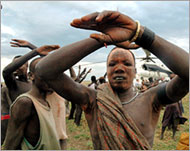Presidents push for Darfur deal
The presidents of Nigeria and Congo Republic have launched a diplomatic push to persuade the parties involved in the conflict in Sudan’s Darfur region to strike a peace deal.

Nigeria‘s Olusegun Obasanjo and Congo‘s Denis Sassou Nguesso, the past and current chairmen of the African Union (AU), were due to meet representatives of the government of Sudan and two rebel groups late on Saturday, first separately and then together.
The meetings, held in a secluded guest house within the Nigerian presidential complex, were unlikely to result immediately in a comprehensive peace agreement but could speed up the process of signing a new ceasefire, observers said.
The AU, which is mediating the talks and has 7,000 peacekeepers in Darfur monitoring an often-violated ceasefire, came up with an improved, more detailed ceasefire proposal on Thursday and the pressure is on the parties to sign it.
AU mediators are due to present their compromise proposals for the other areas under negotiation, power-sharing and wealth-sharing, in the coming days.
Diplomatic efforts
Peace talks between the government and the rebels, in their seventh round, have been going on for almost two years and diplomatic efforts are intensifying to convince the parties to agree a comprehensive peace before an April 30 deadline set by the AU.
They failed to meet a series of previous deadlines.
 |
|
Non-Arab tribes say Khartoum |
Ali Osman Mohamed Taha, the Sudanese vice president, arrived on Friday in the Nigerian capital, Abuja, venue of the talks, and was due to lead the government delegation in talks with Obasanjo and Sassou Nguesso.
Delegates at the talks expressed hope in the past days that Taha’s visit could yield some progress as he was perhaps mandated to make new concessions on Khartoum‘s behalf.
The rebels have long complained that the government delegation did not have the authority to make the necessary compromises.
On the rebel side, the leaders of two factions returned to Abuja from Darfur and Chad just in time for Saturday night’s talks, signalling that they too were treating the latest diplomatic efforts seriously.
The two are Minni Arcua Minnawi, head of the most powerful faction of the Sudan Liberation Army (SLA), which is split in two, and Khalil Ibrahim, leader of the smaller Justice and Equality Movement (JEM) rebel group.
Non-Arab tribes
The SLA and the JEM, representing mostly non-Arab tribes, took up arms in early 2003 accusing the Arab-dominated government of neglect.
Khartoum responded by providing arms to the predominantly Arab militia, known as Janjaweed, whose campaign of murder, rape, arson and looting killed tens of thousands of people and drove two million from their homes into refugee camps.
Khartoum denies responsibility.
While the peace talks have dragged on in Abuja, violence in Darfur has escalated to the point that many parts of the vast desert region are no-go areas for aid workers.
As well as a peace deal in itself, the possibility of sending UN troops into Darfur is at stake in Abuja because Khartoum has said it will consider a transition from an AU to a UN force only after a deal is signed.